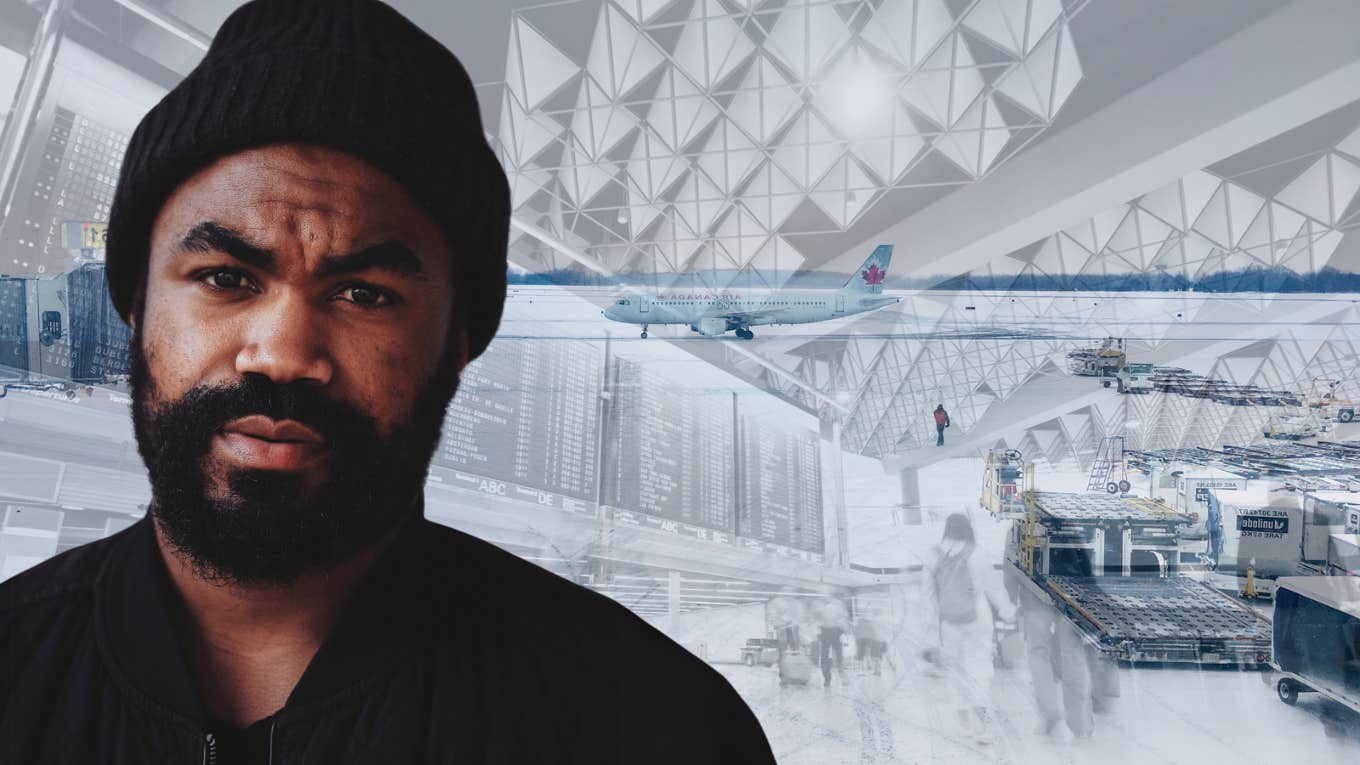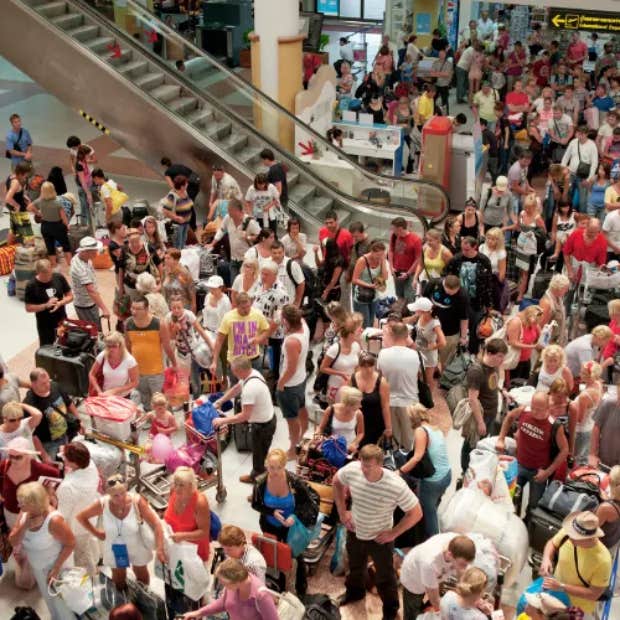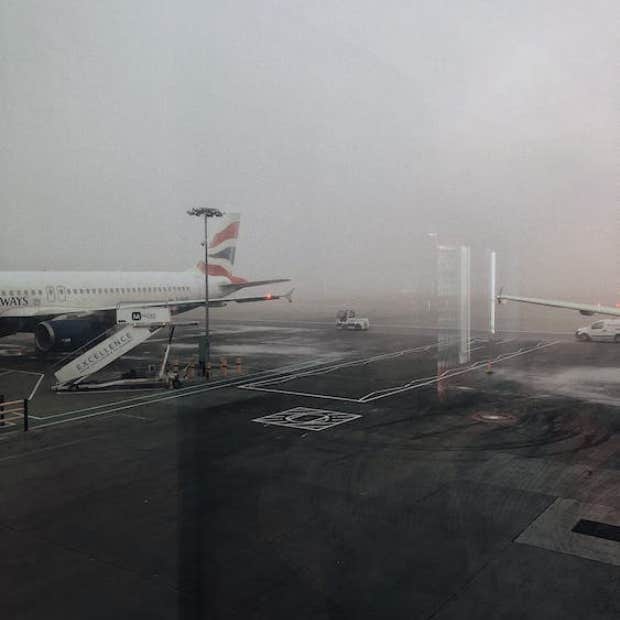Our Holiday Travel Fiasco Revealed These 3 Inconvenient Truths
12,000 flight cancelations was only the tip of the fast-melting iceberg.
 Nikada | Canva, Karim Balaa, Pavel Anoshin | Unsplash
Nikada | Canva, Karim Balaa, Pavel Anoshin | Unsplash I’m currently on hold with Alaska Airlines. It’s the second time I’ve called in two weeks. The first time, I waited over three hours to talk to a representative. I’m expecting the hold time to be at least as long this time around.
I shouldn’t complain, really — it’s my husband who spent over 12 hours of his first and only weeklong vacation in 2022 either transporting himself to and from the airport, waiting in lines, or waiting on hold. None of these efforts bore any fruit, and instead of meeting up with his family and inlaws, he spent Christmas alone.
Of course, he wasn’t the only one whose travel plans were derailed by winter storms. U.S. airlines canceled over 12,000 flights between December 21 and 24, and everyone is angry. Passengers are angry, their families are angry, airline workers are angry, and customer service reps are angry.
Merry freaking Christmas.

Photo: oneclearvision/Canva
Like everyone else, I want my money back and then some. My first call to Alaska Airlines was to get reimbursed for my partner’s flights; now, I’m calling a different number to see about getting reimbursed for all the additional expenses we incurred during my husband’s two failed airport trips. The outraged American in me would also like to sue for emotional damages and demand that someone give us back the hours of precious PTO we’ve both lost while dealing with all this stuff.
I know that my outrage is both unhelpful and disproportionate. Of all the ways that climate change has wrought havoc on our lives, and will almost certainly wreak havoc on our futures, this is a minuscule incident in the grand scheme of things.
Minuscule, yes, but still revealing. Perhaps I indulge my outrage because on the other side of it is fear and anxiety — both around the various ways we need to adapt our behaviors and the various ways we are grossly failing to adapt our behaviors. As news headlines hop from one climate-induced crisis to the next, we respond with indignation and disbelief, as though we haven’t yet grasped that climate chaos is the new “normal,” and that it will only become more frequent, more severe, and more deadly in the years to come.
I’m not trying to rain on anyone’s parade here, but while we’re talking about rain, let’s face the fact that parts of the country are going to have a lot more of it to contend with — icy rain, windy rain, torrential rain — and parts of the country are going to see no rain at all. Neither extreme is going to be pretty, and the consequences have been, and will be, far more dire than 12,000 canceled flights.
So yes, I’m going to stay on hold because by now I’ve already invested over two hours of my life listening to this elevator music, and I want my hard-earned money back.
But I’m also going to use this time to wrestle with three inconvenient, and critical, truths. For instance:
1. We need to stay closer to home
This one is easier said than done, of course, as so many families are strewn across the country and world. Once upon a time, we all lived close to our immediate and extended families, but this is simply no longer the case.
Still, it’s dawning on me just how important it is to build relationships with the people who live within driving distance — and if they’re within walking distance, all the better. Maybe the holidays from now on should be less about family and more about neighbors. And maybe, if we invest the effort, our neighbors can also become a family, of sorts— or at the very least, people we know beyond a passing wave.
In the meantime, whether we’re seeing family, attending conferences, or simply traveling for pleasure, it would serve us well to become more selective about our plane trips. There was a time, not too long ago when exploring the world was a well-respected pastime for those who could afford it. My hippie parents, for instance — each of whom could count the number of plane flights they’d taken as children on one hand — spent a year jet-setting around the world on a shoestring budget. (They ended up in the Southeastern state of Kerala, India for six months, which is where I got my name.)
I grew up in the “golden age” of plane travel. Not only had it become more accessible for the average American, but compared to its current state, it was undeniably more fun. Passengers enjoyed ample legroom, hot breakfasts, and free checked bags, among other luxuries.
Now, plane travel is an undeniable pain, and even on the rare occasion that everything goes smoothly, I still can’t help but think about the tons of carbon my plane is belching into the atmosphere.
Yes, folks, the “golden age” of plane travel has drawn to a decisive close. When we’re beset by the travel itch, it would behoove us to focus more on exploring all that our states and regions have to offer. In the process, we might realize just how much beauty exists close to home.

Photo: Daniel Frank/Pexels
RELATED: Nobody Told Me The Hardest Part Of Traveling The World
2. Businesses can’t carry on with business as usual
Our extractive economy is so laser-focused on maximum profit, that our business leaders refuse to look up and around. If they did, they would find that all of our current strategies for running a so-called “successful” business are fast becoming obsolete.
Silicon Valley swoons over “innovation,” but no one needs another friggin’ app. We don’t need to pivot or innovate to meet demand, we need to pivot and innovate to avoid catastrophe. One by one, our systems are failing us, and it’s the customers and frontline employees who are bearing the brunt.
During COVID-19, a time when air travel was operating well below capacity, airlines could have harnessed their employees’ collective brainpower to figure out how to better respond to severe weather events. Instead, they squandered their $25 billion government bailout on generous retirement packages for senior staff, focusing on short-term profit at our expense.
Even those industries that aren’t (yet) directly impacted by climate change simply can’t carry on with business as usual. As our lives become more inconvenient, as we become more vulnerable to power outages, as we spend more time on hold and more time scouring shelves for items caught up in supply chain delays, our nation’s workers simply need more time to deal with life. In both our personal and professional lives, uncertainty and disruption are becoming the new norm.
RELATED: It's Fine To Blow All Your Money On Travel, Says Research
3. The weather is bigger than all of us

Photo: Lina Kivaka/Pexels
When misfortune or inconvenience strikes, we all want someone to blame. It’s comforting, almost — the notion that a specific people or group of people royally messed up and should therefore make things right.
But if anyone at Alaska Airlines ever takes my call, chances are that this person will be halfway around the world — likely a resident of a country that has contributed very little to climate change yet is currently suffering more severe consequences. This person had absolutely no hand in my partner’s multiple canceled flights and, I’m guessing, has very limited authority to effectively address any of my requests.
That is why I will make my requests respectfully, and I will thank this person for their time, even if they can’t give me what I’m asking for.
The increasing disruptions in our lives are giving rise to a lot of time- and energy-consuming finger-pointing. And while I wouldn’t currently mind giving a few airline CEOs a piece of my mind, the finger-pointing is ultimately pointless.
What if we set aside the in-fighting and harnessed our collective outrage to fight climate change? What if we channeled our time and energy into building climate resiliency? If we have to get something off our chest, let’s at least stop yelling at customer service reps and start yelling at the CEOs of the 90 companies most responsible for climate change.
I’m now entering my fourth hour on hold with Alaska Airlines, and I’ll admit — a lot of the time, it’s difficult for me to feel empowered. But we’re not entirely helpless. For each of these inconvenient truths, there is something we can do. Here’s what I’ve done, and here’s what I plan to do in 2023:
To build our local community and economy, I organized a block party this past summer and challenged myself to do the vast majority of my shopping in person at locally owned businesses. I plan to do both again this year and also to launch a monthly neighborhood potluck and game night.
At work, I was part of an effort to form a Work-Life Balance Committee and have done quite a bit of independent research on four-day work weeks. My partner cut back his schedule to 3.5 days a week and I’m exploring a reduced schedule as well. For us, the financial trade-offs are real but feasible. We can always buy less stuff.
When things don’t go as planned, I’m trying my best to channel my outrage into something positive. As a co-owner of a worker-owned cooperative, I see so much potential for cooperative businesses to challenge the core principles of our extractive economy — namely, mass exploitation, unsustainable growth, and allegiance to wealthy shareholders. (If Alaska Airlines were owned by its workers, I can guarantee you that whoever picks up my call would be empowered, and incentivized, to find a solution to my problem.) In 2023, I hope to help lay the groundwork for a local cooperative ecosystem that actively defies “business as usual.”
Simply put, each of us can do something, no matter how big or how small. We can’t keep putting our future on hold.
RELATED: Do Not Travel With Your Friends Until You Can Answer These 8 Questions
Kerala Taylor is an award-winning writer and co-owner of a worker-owned marketing agency. Her weekly stories are dedicated to interrupting notions of what it means to be a mother, woman, worker, and wife. She writes on Medium and has recently launched a Substack publication Mom, Interrupted.
